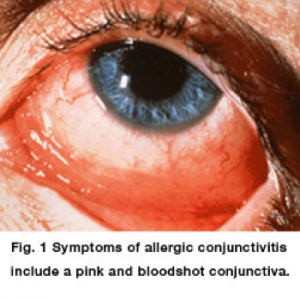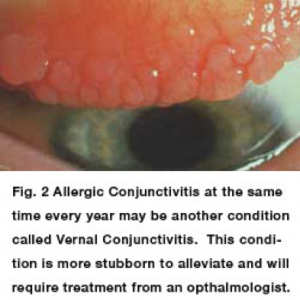What is allergic conjunctivitis?
Allergic conjunctivitis is a very common eye condition affecting more than 20% of the population. It is a reaction of the eye to allergens in the environment such as dust, pollen, animal dander, and medications. If someone is allergic to a particular substance and is exposed to it, an allergic reaction may be triggered causing red, watery, itchy or swollen eyes. This is not an infection and is not contagious, but can be very irritating.
What causes allergic conjunctivitis?
Allergic conjunctivitis is caused by contact with particles like pollen or mold that your body is sensitized to. Spring, summer and fall allergies tend to be due to what is currently blooming outside during those times. Other common allergens include house dust, mold and animal hair which can cause allergic conjunctivitis in the winter months.
What are some common symptoms of allergic conjunctivitis?
Symptoms may vary from very mild to severe. Itching is the most common symptom from eye allergies. Other symptoms often include stinging, tearing, burning and gritty eyes. The conjunctiva (the thin membrane covering the white part of the eye and the inside of the eyelids) will be pink and bloodshot. The area around the color of the eyes can swell causing tiny blisters on the surface of the eye (limbal follicles) [See figure 1]. The eyelid skin is very thin and can become quite swollen and red. Children may rub their eyes, roll their eyes, or do a hard blink to relieve the itch.

Is allergy testing necessary to find out what is causing the allergic reaction?
Diagnosis is made by history and clinical examination; therefore, allergy testing is usually not necessary. Treatments are generally the same no matter what allergen is causing the reaction. Moreover, the types of allergens involved are usually very common things like grass, weed, and tree pollens which are often hard to avoid.
How do you treat allergic conjunctivitis?
Avoiding the allergen may be the most reasonable behavior modification however that is not always possible. For example, in case of pollen allergies, the symptoms are worsened by outdoors activities and relieved by wearing glasses/ googles to limit the contact of the allergens with the eyes. Washing the face also improves the symptoms by washing away the allergens. Plain artificial tears help by the same mechanism. Using them cold relieves the irritation better than using them at room temperature. Cold compresses applied to the eyes also help reduce the allergic reaction. It is also important to avoid rubbing the eyes.
What medication(s) are available to treat allergic conjunctivitis?
Both prescription and non-prescription (over the counter) eye drop medications are available for the treatment of allergic conjunctivitis. These medications often have several different effects (antihistamines and mast cell stabilizers) on the eye to help alleviate the allergic reaction. They are more effective if used daily, but some can also be used on an as needed basis.
What options are available if anti-allergy eye drops are not helping?
There are different classes of anti-allergy drops with different types of actions. Sometimes what works well for one person’s allergies may not work as well for somebody else and the drops usually need some time to work. If the symptoms remain the same despite medication, trying a different antihistamine drop may be helpful. In addition, oral medication can provide relief for children who won’t tolerate drops or who also have other symptoms including runny nose. Cold compresses can help the itching and swelling, but many small children will not tolerate them.
Are steroid eye drops okay for children?
Yes, sometimes a short course of steroid eye drops along with the anti-histamine type eye drops is required to quiet the severe allergic reaction. Steroid use should be monitored closely by your ophthalmologist.
Why can’t steroid drops be used all the time?
There is a risk of inducing glaucoma in eyes after prolonged steroid usage. Excessive or long term use can also lead to the development of cataracts. Consult your ophthalmologist about how long and frequently a steroid drop may be used since different steroid drops have different risks. A child on steroid drops needs to be monitored for these side effects. Only doctors who can monitor for side effects should prescribe steroids for allergic conjunctivitis.
Prognosis
Usually favorable due to the self-limiting nature of this condition, however complications can occur related to eye rubbing, overlapping infections or steroid medication use
What is Vernal Conjunctivitis?

Vernal Conjunctivitis is a severe episode of seasonal allergic conjunctivitis. It is common in young boys and can occur the same time each year, but does eventually get outgrown. Typically these symptoms are so severe they require a short course of topical steroids for relief in addition to an antihistamine drop. [See figure 2].
Credits: Journal of American Association for Pediatric Ophthalmology and Strabismus